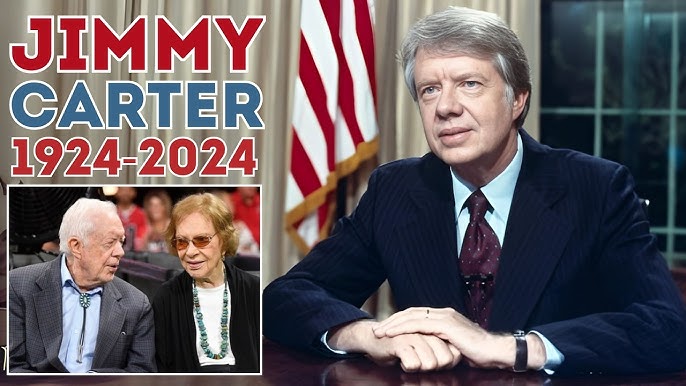(ThyBlackMan.com) My earliest memories of anything related to the presidency are yellow ribbons tied around trees. The ribbons signified the hope that 53 Americans who had been taken hostage in Iran would be safely released. Jimmy Carter was president. I was 9 years old.
Fairly or otherwise, that crisis became perhaps the most important issue of Carter’s White House tenure. He knew that the precipitating event — his allowing the Shah of Iran to enter the U.S. for cancer treatment — could result in violence against Americans.

Against his better judgement, Carter bowed to powerful voices like Henry Kissinger’s. The president’s misgivings proved to be prescient. After the Shah arrived, Iranian students kidnapped the Americans. Relations between the two nations have never recovered.
As I think about that crisis, it occurs to me that Carter embodied everything that most Americans say they want in a president — though, in reality, they don’t. For example, we claim to want someone who single-mindedly focuses on our interests, which is what Carter did (obsessively so) during the hostage crisis and the concurrent economic crisis. That didn’t matter.
Americans also pretend to want a president who is inveterately truthful, a trait that Carter epitomized. He was unflinchingly truthful, even publicly admitting his shortcomings as president. But his transparency backfired, contributing to a perception of ineffectiveness.
Of course, Carter did experience major successes during his term. Perhaps most significant among these was his dogged perseverance in brokering a lasting peace treaty between Egypt and Israel — nations that experienced decades of enmity. A much more controversial achievement was Carter’s overcoming staunch congressional opposition to return the Panama Canal to its namesake country, which his immediate successor greatly criticized.
Domestically, Carter was a major proponent of civil rights. Though his father was an unrepentant racist, Carter appointed more people of color and women to the federal bench (during just one term) than all his predecessors combined.
Despite his achievements, most Americans don’t reflect fondly on Carter’s presidency. Instead, he is widely viewed as having had the most consequential post-presidency in history. Recognized globally as a champion of human rights, his approval ratings are much higher today than they were when he was commander-in-chief.
Thus, the obituaries, tributes, and remembrances this week have focused primarily on Carter’s “second act,” which elevated him to a category all his own. Biographer Kai Bird expressed that Jimmy Carter is the only president who used the White House as a steppingstone to achieve greater things. For example, our longest-living former president rallied the world to nearly eradicate the dreaded Guinea worm in poor nations.
The obstinance that Carter displayed throughout his life often drove him to take on monumental challenges. This included his nettlesome tendency to weigh in on policy matters, often in opposition to official policy under his successors. In fact, even as his reputation was buoyed among the public, Carter’s relationships with presidents — of both parties — were often fraught and frosty.
Tragically, President Carter’s death at 100 is a metaphor for the demise of a politics that is not likely ever to return. Few Democrats today would vote for him, even though he was staunchly anti-death penalty. (He would be considered “too conservative.”) Even fewer Republicans today would consider voting for him, even though he was staunchly pro-life and arguably the most devoutly Christian of any 20th century president. (He would be considered “too liberal.”)
Our politics are intransigent, myopic, and bitter. Every serious presidential aspirant understands that violating a few key tenets of either major party is an unpardonable sin. As Peter Baker of “The New York Times” has suggested, every White House occupant after Carter has assiduously tried to avoid being the kind of president he was — even as they respect the kind of man that he was. (Well, all but one of them.)
Though President Carter was highly confident in his intelligence, his work ethic, and his moral code, a story involving his mother is quite instructive in understanding him. On the evening of his election to the Oval Office, a reporter asked Lillian Carter if she was proud of her son. Her response? “Which one?”
Thus, whereas many men who possessed substantially fewer gifts than Carter would be unabashed narcissists, the 39th president always had an aura of genuine humility. (He carried his own bags and refused to allow the playing of “Hail to the Chief” when he entered a room.) Having been elected during America’s bicentennial, Carter wanted to transform the presidency into one that was more personal, more aspirational, and more compassionate.
During his re-election bid, America soundly rejected Carter’s vision in the hopes of securing lower inflation rates and cheaper energy prices. (He had chastised Americans regarding consumption, championed electric vehicles, and put solar panels on the White House). And even though Carter had appointed Fed Chair Paul Volcker to fix the economy, Ronald Reagan would receive the credit. In short, stubbornness, a bland personality, and bad timing sunk his presidency.
Carter was the only Democrat elected to the White House between 1968 and 1992. However, one could well argue that he would not have won were it not for the Watergate scandal. This is despite the fact that Carter was the personification of the American myth. He was, quite literally, dirt poor growing up.
Further, Carter was always the smartest and hardest working person in the room. He was a genuine outsider who had no interest in being an insider. He believed in American leadership, (though not necessarily American exceptionalism).
Jimmy Carter was the man who any parent would want to call their son, and any child would want to call their father. Yet, to our eternal shame, not enough of us wanted to call him “Mr. President”.
Written by Larry Smith

















Leave a Reply